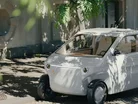How Luvly is the Swedish flat-packed electric vehicle?

There’s something to be said for the simplicity of electric vehicles (EVs) despite the evolving technology incorporated into their design and build. Realistically, the reduction in moving parts is a more sustainable and, in the future, more cost-effective way to build cars and reduce tailpipe emissions.
The efforts to reduce urban emissions are supported by the growing number of micro cars and smaller transport methods in development, but a Swedish car manufacturer is looking to reinvent the way drivers approach new car purchasing.
The micro car brand Luvly is effectively making flat-packed cars that can be shipped to local distributors in a package with a smaller footprint and assembled by experts with minimal effort.
The unique design of the Luvly is an effort by the company to replicate IKEA’s business model, taking advantage of the country’s most simplistic production method.
Built with lightweight, recyclable materials, the Swedish company is looking to create a product that goes full circle while providing a safe and convenient way for drivers to commute around cities. The company preaches kindness to pedestrians, animals, and everyone else affected by urban transport as the Luvly micro car reduces congestion on two fronts—emissions and city traffic.
The car is built using, what Luvly calls, “slow formula racing tech”, which enables a safe format in such a compact package.
Why would consumers buy a Luvly micro EV?
Consumers are coming around to the idea of more sustainable and convenient transport methods. The Luvly, like many other micro cars, addresses a few issues that plague those living in cities.
The first is parking. With such a small car, the parking dilemma becomes much smaller. Secondly, ease is important in modern transport, and the micro car is one that goes more places than the majority of other cars on the road. Instead of adopting two-wheeled transport, which can often be more dangerous, enjoying the drive in the Luvly makes compact travel a much safer experience.
We expect that with fewer components, the footprint of the lightweight Luvly vehicle will be much smaller—literally and in terms of greenhouse gas (GHG) emissions. Shipping cars is currently costly for the environment, but the ability to distribute new vehicles in such a compact form gives Luvly a sustainable edge, allowing drivers to greatly reduce their carbon footprints.
Low cost is also an important factor that could drive consumers to want one of these cars as the reduction in shipping price and purchase price will be crucial in the success of the flat-packed car business.
As a low power, low speed vehicle that fits into the same category as the Citroen Ami or the Renault Twizy, sustainability is a key selling point for the product as Luvly begins accumulating a list of waiting clients to receive the first-of-a-kind EV.
- Voltpost Secures Grants for Nationwide Lamppost EV ChargersCharging & Infrastructure
- San Francisco Expands Curbside EV Charging ProgrammeCharging & Infrastructure
- Hyundai Invests US$16.6bn in EVs and Hydrogen InnovationMobility
- Nissan's Bold Manufacturing Move: Electrifying the R32Technology

